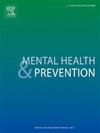青少年情绪调节与心理健康的关系:自我同情的调节作用
IF 2.4
Q2 Medicine
引用次数: 0
摘要
降职调节和自我同情在塑造心理健康和幸福方面发挥着重要作用。然而,到目前为止,还没有研究探索这些结构如何在普通青少年人群中相互作用。本研究考察了青少年不同维度的自我同情(富有同情心的自我反应和无同情心的自我反应)、情绪调节(认知重评和表达抑制)和心理健康(抑郁和焦虑症状)之间的关系。它还研究了自我同情成分是否调节情绪调节和心理健康症状之间的关系。方法本研究中使用的数据来自于在澳大利亚九所高中进行的心理健康预防项目的聚类随机对照试验。采用多元回归分析检验自我同情和情绪调节策略是否为焦虑和抑郁得分的显著预测因子。情绪调节和自我同情在焦虑和抑郁得分上的相互作用也得到了检验。结果752名澳大利亚青少年纳入研究(Mage = 13.83, SD = 0.78)。认知重评和富有同情心的自我反应负向预测焦虑和抑郁得分,而表达性抑制和无同情心的自我反应正向预测焦虑和抑郁得分。有同情心的自我反应和无同情心的自我反应对情绪调节策略与焦虑、抑郁得分的关系有显著调节作用。结论本研究首次揭示了自我同情在青少年情绪调节框架中的关键作用。未来的研究应将自我同情和情绪调节作为青少年干预的潜在目标。本文章由计算机程序翻译,如有差异,请以英文原文为准。
The relationship between emotion regulation and mental health in adolescents: Self-compassion as a moderator
Background
Emotion regulation and self-compassion play important roles in shaping mental health and wellbeing. However, no studies to date have explored how these constructs may interact in the general adolescent population. This study examined the associations between different dimensions of self-compassion (compassionate self-responding and uncompassionate self-responding), emotion regulation (cognitive reappraisal and expression suppression) and mental health (depression and anxiety symptoms) among adolescents. It also examined whether self-compassion components moderate the relationships between emotion regulation and mental health symptoms.
Method
Data used in this study is drawn from a clustered RCT of a mental health prevention program conducted across nine Australian high schools. Multiple regression analyses were conducted to test whether self-compassion and emotion regulation strategies are significant predictors of anxiety and depression scores. Interactions between emotion regulation and self-compassion on anxiety and depression scores were also examined.
Results
752 Australian adolescents were included in the study (Mage = 13.83, SD = 0.78). Cognitive reappraisal and compassionate self-responding negatively predicted anxiety and depression scores, while expressive suppression and uncompassionate self-responding positively predicted these outcomes. Compassionate self-responding and uncompassionate self-responding differentially moderated the relationships between emotion regulation strategies and anxiety and depression scores.
Conclusion
The current study is the first to show the key role of self-compassion within adolescents’ emotion regulation framework. Future research should examine self-compassion and emotion regulation together as potential intervention targets for adolescents.
求助全文
通过发布文献求助,成功后即可免费获取论文全文。
去求助
来源期刊

Mental Health and Prevention
Medicine-Psychiatry and Mental Health
CiteScore
2.10
自引率
0.00%
发文量
22
审稿时长
24 days
 求助内容:
求助内容: 应助结果提醒方式:
应助结果提醒方式:


